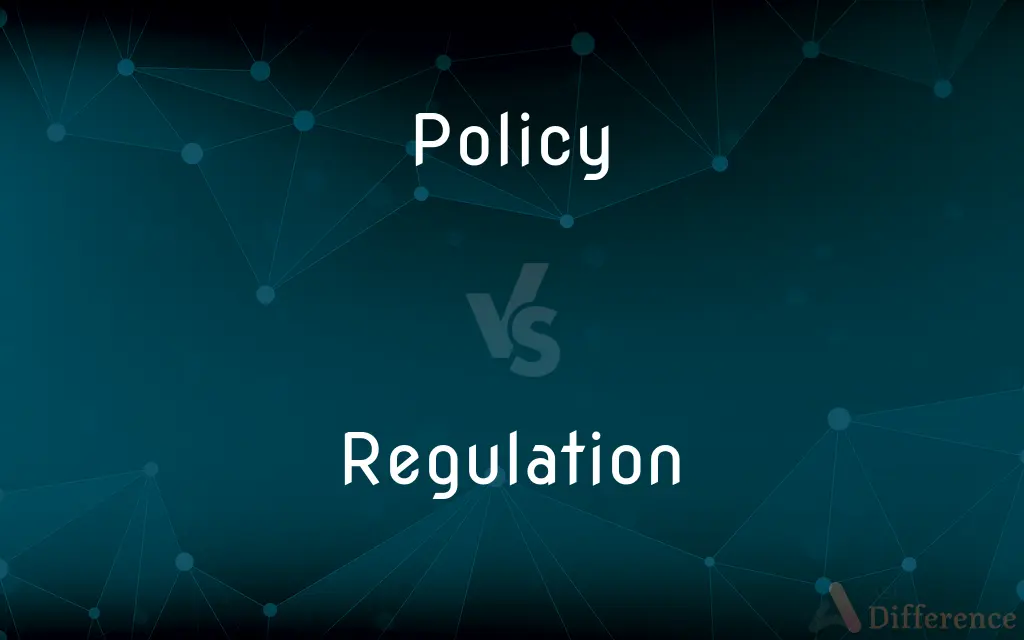Policy vs. Regulation — What's the Difference?
Edited by Tayyaba Rehman — By Maham Liaqat — Updated on March 29, 2024
Policy is a principle guiding decisions, while regulation is a rule enforced by authorities.

Difference Between Policy and Regulation
Table of Contents
ADVERTISEMENT
Key Differences
A policy is a course or principle of action adopted or proposed by an organization or individual, intended to influence and determine decisions, actions, and other matters. In contrast, a regulation is a specific rule or law designed to control or govern conduct, usually created and enforced by governmental bodies. Regulations are legally binding and must be followed by individuals and organizations within the jurisdiction.
Policies serve as frameworks within which an organization operates, offering guidelines that shape its culture, processes, and decision-making. Regulations, however, are established to protect public interests, safety, and welfare; they have the force of law and often come with penalties for non-compliance.
The development and enforcement of policies are typically internal to an organization and can be adjusted or revised according to the organization's needs and objectives. For instance, a company may revise its privacy policy in response to feedback from customers or changes in business strategy. On the other hand, regulations are developed through legal processes and can only be changed through legislative action or regulatory bodies. This means that while organizations have control over their policies, they must comply with external regulations that apply to their operations.
Policies often reflect an organization's values and mission, serving as a tool for implementing strategic goals and ensuring consistency in decision-making and practices. They can apply to a wide range of areas, including but not limited to, human resources, IT security, and customer service. Regulations, in contrast, are focused on compliance and legal requirements, aiming to ensure fairness, safety, and standards across industries and society. They can cover areas such as labor laws, environmental protection, and financial compliance.
The relationship between policy and regulation is dynamic. Policies within an organization can be influenced by existing regulations, and at times, organizational policies may advocate for or lead to the development of new regulations. For example, a corporation's environmental sustainability policy may exceed current regulations and set a precedent that influences future regulatory standards. Conversely, new regulations can require organizations to adapt their policies to ensure compliance.
ADVERTISEMENT
Comparison Chart
Definition
A principle or rule guiding decisions within organizations.
A rule or law enforced by authorities to control behavior.
Purpose
To outline internal guidelines and strategies for decision-making.
To protect public welfare, ensure safety, and enforce standards.
Enforcement
Internally by organizations.
By governmental bodies, with legal consequences for non-compliance.
Flexibility
Can be adjusted or revised according to organizational needs.
Mandatory and specific, changed only through legal processes.
Scope
Reflects organizational values and goals across various areas.
Focuses on compliance and legal requirements across industries and society.
Compare with Definitions
Policy
A deliberate system of principles to guide decisions and achieve rational outcomes.
The company's remote work policy allows employees flexibility while ensuring productivity.
Regulation
Legally binding and enforced by governmental agencies.
Environmental regulations limit the amount of emissions factories can release.
Policy
An internal guideline set by an organization.
The university's admissions policy aims to promote diversity and inclusion.
Regulation
Specific, detailed, and aimed at compliance.
Building regulations specify minimum construction standards for safety.
Policy
A statement of intent, and is implemented as a procedure or protocol.
Our privacy policy outlines how we handle customer data.
Regulation
A rule or directive made and maintained by an authority.
Financial regulations require banks to maintain adequate capital reserves.
Policy
Can be informal or formal, broad or specific.
The informal dress code policy encourages a relaxed office environment.
Regulation
Affects a wide range of societal and industry practices.
Labor regulations protect workers' rights and ensure fair employment practices.
Policy
Often developed to safeguard the organization's interests and values.
The non-discrimination policy ensures a workplace free from harassment.
Regulation
Developed through legislative processes or by regulatory bodies.
The health department issues regulations to ensure public safety in restaurants.
Policy
Policy is a deliberate system of principles to guide decisions and achieve rational outcomes. A policy is a statement of intent, and is implemented as a procedure or protocol.
Regulation
Regulation is the management of complex systems according to a set of rules and trends. In systems theory, these types of rules exist in various fields of biology and society, but the term has slightly different meanings according to context.
Policy
A course or principle of action adopted or proposed by an organization or individual
It is not company policy to dispense with our older workers
The government's controversial economic policies
Regulation
A rule or directive made and maintained by an authority
Planning regulations
Policy
A contract of insurance
They took out a joint policy
Regulation
The action or process of regulating or being regulated
The regulation of financial markets
Policy
An illegal lottery or numbers game
He swore that he had never played policy in his life
Regulation
The act of regulating or the state of being regulated.
Policy
A plan or course of action, as of a government, political party, or business, intended to influence and determine decisions, actions, and other matters
American foreign policy.
The company's personnel policy.
Regulation
A principle, rule, or law designed to control or govern conduct.
Policy
A course of action, guiding principle, or procedure considered expedient, prudent, or advantageous
Honesty is the best policy.
Regulation
A governmental order having the force of law. Also called executive order.
Policy
Prudence, shrewdness, or sagacity in practical matters
It is never good policy to speak rashly.
Regulation
(Embryology) The capacity of an embryo to continue normal development following injury to or alteration of a structure.
Policy
A written contract or certificate of insurance.
Regulation
(Sports) The standard playing period for a timed game, prior to overtime or a shootout.
Policy
A numbers game.
Regulation
(uncountable) The act of regulating or the condition of being regulated.
Policy
A principle of behaviour, conduct etc. thought to be desirable or necessary, especially as formally expressed by a government or other authoritative body.
The Communist Party has a policy of returning power to the workers.
It's company policy that all mobile phones are forbidden in meetings.
Regulation
(countable) A law or administrative rule, issued by an organization, used to guide or prescribe the conduct of members of that organization.
Army regulations state a soldier AWOL over 30 days is a deserter.
Policy
Wise or advantageous conduct; prudence, formerly also with connotations of craftiness.
Regulation
A type of law made by the executive branch of government, usually by virtue of a statute made by the legislative branch giving the executive the authority to do so.
Policy
Specifically, political shrewdness or (formerly) cunning; statecraft.
Regulation
A numbered provision within such kind of law.
Policy
The grounds of a large country house.
Regulation
(European Union law) A form of legislative act which is self-effecting, and requires no further intervention by the Member States to become law.
Policy
(obsolete) The art of governance; political science.
Regulation
(genetics) Mechanism controlling DNA transcription.
Policy
(obsolete) A state; a polity.
Regulation
(medicine) Physiological process which consists in maintaining homoeostasis.
Policy
(obsolete) A set political system; civil administration.
Regulation
In conformity with applicable rules and regulations.
Policy
(obsolete) A trick; a stratagem.
Regulation
The act of regulating, or the state of being regulated.
The temper and regulation of our own minds.
Policy
(obsolete) Motive; object; inducement.
Regulation
A rule or order prescribed for management or government; prescription; a regulating principle; a governing direction; precept; law; as, the regulations of a society or a school.
Policy
(law)
Regulation
An authoritative rule
Policy
A contract of insurance.
Regulation
A principle or condition that customarily governs behavior;
It was his rule to take a walk before breakfast
Short haircuts were the regulation
Policy
A document containing or certifying this contract.
Your insurance policy covers fire and theft only.
Regulation
The state of being controlled or governed
Policy
(obsolete) An illegal daily lottery in late nineteenth and early twentieth century USA on numbers drawn from a lottery wheel (no plural)
Regulation
(embryology) the ability of an early embryo to continue normal development after its structure has been somehow damaged or altered
Policy
A number pool lottery
Regulation
The act of bringing to uniformity; making regular
Policy
(transitive) To regulate by laws; to reduce to order.
Regulation
The act of controlling or directing according to rule;
Fiscal regulations are in the hands of politicians
Policy
Civil polity.
Regulation
Prescribed by or according to regulation;
Regulation army equipment
Policy
The settled method by which the government and affairs of a nation are, or may be, administered; a system of public or official administration, as designed to promote the external or internal prosperity of a state.
Policy
The method by which any institution is administered; system of management; course.
Policy
Management or administration based on temporal or material interest, rather than on principles of equity or honor; hence, worldly wisdom; dexterity of management; cunning; stratagem.
Policy
Prudence or wisdom in the management of public and private affairs; wisdom; sagacity; wit.
The very policy of a hostess, finding his purse so far above his clothes, did detect him.
Policy
Motive; object; inducement.
What policy have you to bestow a benefit where it is counted an injury?
Policy
A ticket or warrant for money in the public funds.
Policy
The writing or instrument in which a contract of insurance is embodied; an instrument in writing containing the terms and conditions on which one party engages to indemnify another against loss arising from certain hazards, perils, or risks to which his person or property may be exposed. See Insurance.
Policy
A method of gambling by betting as to what numbers will be drawn in a lottery; as, to play policy.
Policy
To regulate by laws; to reduce to order.
Policy
A line of argument rationalizing the course of action of a government;
They debated the policy or impolicy of the proposed legislation
Policy
A plan of action adopted by an individual or social group;
It was a policy of retribution
A politician keeps changing his policies
Policy
Written contract or certificate of insurance;
You should have read the small print on your policy
Common Curiosities
How are policies developed?
Policies are developed internally by organizations to guide their operations and decision-making, often through consultation with stakeholders.
Can a company's policy override a regulation?
No, a company's policy cannot override regulations. Regulations are legally binding and must be followed.
What is the difference between a policy and a regulation?
A policy is a guideline for decision-making within organizations, while a regulation is a legally enforceable rule set by authorities.
Can an organization have multiple policies?
Yes, an organization can have multiple policies covering various aspects of its operations, from employment practices to data protection.
Why are regulations important?
Regulations are important for protecting public interests, safety, and welfare by ensuring compliance with standards and laws.
Who enforces regulations?
Regulations are enforced by governmental bodies or regulatory agencies, with the authority to impose penalties for non-compliance.
Can policies be flexible?
Yes, policies can be flexible and revised according to an organization’s changing needs, unlike regulations which are fixed until legally changed.
Do policies apply to everyone within an organization?
Yes, policies are intended to apply to everyone within an organization, although specific policies may target particular groups or roles.
How do policies and regulations interact?
Policies and regulations interact dynamically; policies can be influenced by regulations, and in some cases, policies may lead to the development of new regulations.
Can policies be challenged or appealed?
While policies themselves are not legally enforceable, actions taken under them can be challenged if they conflict with employee rights or regulations.
How do regulations impact businesses?
Regulations impact businesses by requiring them to comply with legal standards, which can affect operational practices, costs, and compliance efforts.
How do individuals learn about regulations?
Individuals learn about regulations through official government publications, industry guidance, legal advice, and educational resources.
What happens if a policy conflicts with a regulation?
If a policy conflicts with a regulation, the regulation takes precedence, and the policy must be revised to ensure compliance.
Are regulations the same in every country?
No, regulations vary by country and jurisdiction, reflecting different legal systems, cultural norms, and policy priorities.
What role do stakeholders play in policy development?
Stakeholders play a crucial role in policy development by providing input, feedback, and perspectives that shape the policy’s direction and implementation.
Share Your Discovery

Previous Comparison
Skin vs. Hide
Next Comparison
Anguish vs. AgonyAuthor Spotlight
Written by
Maham LiaqatEdited by
Tayyaba RehmanTayyaba Rehman is a distinguished writer, currently serving as a primary contributor to askdifference.com. As a researcher in semantics and etymology, Tayyaba's passion for the complexity of languages and their distinctions has found a perfect home on the platform. Tayyaba delves into the intricacies of language, distinguishing between commonly confused words and phrases, thereby providing clarity for readers worldwide.















































